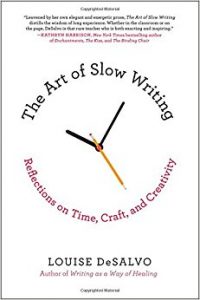 A few weeks ago an editing client presented me with a question. “How can I know,” she asked, “which direction is the best one for this story to take?” Her novel was essentially finished but there were issues with the middle so she’d hired me to provide feedback. Her beta readers had highlighted the muddied middle, and the writer herself knew it was a problem. There was so much going on that the through line of the story had gotten cloudy and the ending, while nicely executed, didn’t have the punch it deserved. Each of the beta readers, however, had come up with a different solution. One reader suggested thread A be dropped, another loved thread A but argued that thread B needed to go.
A few weeks ago an editing client presented me with a question. “How can I know,” she asked, “which direction is the best one for this story to take?” Her novel was essentially finished but there were issues with the middle so she’d hired me to provide feedback. Her beta readers had highlighted the muddied middle, and the writer herself knew it was a problem. There was so much going on that the through line of the story had gotten cloudy and the ending, while nicely executed, didn’t have the punch it deserved. Each of the beta readers, however, had come up with a different solution. One reader suggested thread A be dropped, another loved thread A but argued that thread B needed to go.
The writer wanted me to make the final decision and choose one. I couldn’t. I could point out the pros and cons of losing one thread over the other. I could give my opinion on how each thread deepened the basic conflict and impacted the main character (and even the supporting players). I could discuss and debate the ending payoff of one thread over another but I could not choose. For one thing, there are many right ways to tell a story. The story could be told, and told well, minus either of the two threads. Most importantly, however, it wasn’t my novel. I could advise, I could be a midwife to her process, but she had to birth the story herself.
She needed to find her true north, or the true north for this particular novel, and go from there.
True north is our internal compass. It guides us through life at our deepest level and helps us stay on track. With all the chatter we’re subjected to on a daily basis – from family, friends, the media or, in this case, from beta readers, it’s easy to lose sight of true north. It’s easy to doubt our instincts when we can barely hear the still, small voice of our soul.
I suggested to this writer that she employ Vanessa Grant’s ‘garbage can’ test. Pretend she’s throwing thread A in the garbage can and proceeding with thread B. How does that make her feel at a gut level? Then I told her to switch it up and pretend she’s throwing thread B in the garbage and moving forward with thread A. How is her gut feeling now? Don’t overthink it, I told her. Go with the initial feelings that arise. She could do this exercise in a few minutes or spend a couple of days mulling it over. But she needed to honor her feelings and not over analyse them.
She needed to decide what was most important to her, what direction would give her the most satisfaction when it came to writing the novel. There wasn’t a right way or a wrong way. There was only her way.
True north would point her in the right direction.

 The first crop of spring asparagus has arrived. Field asparagus, I mean. There’s such a thing as sea asparagus too, and that’ll show up at the market in June, right around my wedding anniversary. Sea asparagus is delicious. The tiny stalks are thinner than a straw and their taste is subtle but unique: a little ocean and a little lettuce. There’s nothing fishy about sea asparagus, nothing even remotely close in taste to its earth-grown cousin.
The first crop of spring asparagus has arrived. Field asparagus, I mean. There’s such a thing as sea asparagus too, and that’ll show up at the market in June, right around my wedding anniversary. Sea asparagus is delicious. The tiny stalks are thinner than a straw and their taste is subtle but unique: a little ocean and a little lettuce. There’s nothing fishy about sea asparagus, nothing even remotely close in taste to its earth-grown cousin. The universe has such a sense of humor.
The universe has such a sense of humor. Since I’m still in the middle of two gnarly deadlines, this week’s blog will be short and sweet.
Since I’m still in the middle of two gnarly deadlines, this week’s blog will be short and sweet. Some books, despite your best efforts, end up a little like the proverbial wallflower at a party. Though they have a great story, a great cover, receive a solid push from the publisher, and they come out ready to shine, they end up sidelined on a shelf for some reason, never really making a solid impression.
Some books, despite your best efforts, end up a little like the proverbial wallflower at a party. Though they have a great story, a great cover, receive a solid push from the publisher, and they come out ready to shine, they end up sidelined on a shelf for some reason, never really making a solid impression. If you’re a squeamish, goat- loving vegan this blog may not be for you.
If you’re a squeamish, goat- loving vegan this blog may not be for you.  In my last blog I mentioned slogging my way through a book I didn’t enjoy all that much. This week’s reading has been much more enjoyable, but then I always love a Kristan Higgins book. And her latest is a real winner.
In my last blog I mentioned slogging my way through a book I didn’t enjoy all that much. This week’s reading has been much more enjoyable, but then I always love a Kristan Higgins book. And her latest is a real winner. Some days – some weeks – all you want is fuzzy puppies and cotton candy, or, at the very least, a story that gives you a happy ending.
Some days – some weeks – all you want is fuzzy puppies and cotton candy, or, at the very least, a story that gives you a happy ending. . . . simply a pair of fresh eyes. So said American writer Thomas Higginson. I’m not sure I’d go that far but I do think a pair of fresh eyes is essential when it comes to refining a manuscript.
. . . simply a pair of fresh eyes. So said American writer Thomas Higginson. I’m not sure I’d go that far but I do think a pair of fresh eyes is essential when it comes to refining a manuscript.
Comments